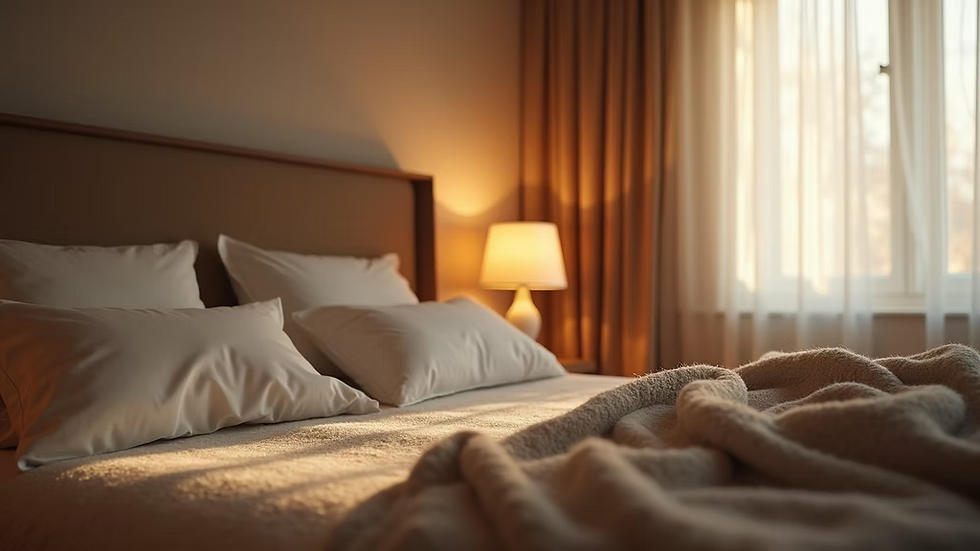- Aug 13, 2025
- 3 min read
Updated: Sep 1, 2025
Perimenopause can be overwhelming and absolutely unpredictable. Hormonal changes lead to various symptoms that disturb daily life, including sleep disturbances. If you find yourself suddenly tossing and turning at night, you're not alone. A significant percentage of women experience insomnia and nighttime anxiety during perimenopause, making an already difficult transition even worse.

Understanding Perimenopause and Sleep Disturbances
According to the book The New Menopause, nearly 60% of women report difficulties with falling or staying asleep. Recognizing the link between hormone levels and sleep is important to manage insomnia during perimenopause. Listed below are some of the most common sleep disturbances that women experience.
Common Sleep Issues
Insomnia
Night Sweats
Anxiety
Restless Leg Syndrome
Night Terrors
Tips for Better Sleep
Create a Relaxing Bedtime Routine
Establish a calming bedtime routine to help signal to your body that it's time to wind down. Incorporate soothing activities such as reading, drinking calming herbal tea, or taking a warm bath. Keep your routine consistent by going to bed and waking up at the same times each day—even on weekends—to help regulate your internal clock.
Optimize Your Sleep Environment
Transform your bedroom into a tranquil sleep sanctuary. Keep it cool—ideally between 60 and 67 °F—and dark, using blackout curtains to block out light. The goal is to create an environment that promotes restful, uninterrupted sleep. You might also want to consider investing in a comfortable mattress and supportive pillows to enhance overall sleep quality.
Manage Night Sweats
If night sweats disrupt your rest, try taking a shower before bed and opting for lightweight, breathable sleepwear. Moisture-wicking pajamas can help keep you cool and comfortable, and using a fan or cooling‑gel pillow can further regulate your body temperature to support a more comfortable sleep environment.
Limit Stimulants
Caffeine and nicotine can serve as sleep disruptors. Limit these substances, especially in the hours leading up to bedtime. While alcohol might seem relaxing, it can interfere with your sleep cycle. Dr. Haver notes that even one evening drink can disrupt sleep and exacerbate hot flashes.
Practice Mindfulness and Relaxation Techniques
Incorporating mindfulness practices can aid in reducing nighttime anxiety. Techniques such as meditation and deep breathing help calm your mind and promote relaxation. Dedicate a few minutes each evening to focus on your breath or visualize a peaceful scene to help prepare your body for sleep.
Consider Natural Supplements
Some women find relief from sleep disturbances with natural supplements. Melatonin, valerian root, L theanine, and magnesium may help improve sleep quality. Always consult with your healthcare provider before starting a new supplement regimen to ensure it’s safe for you.
Stay Active During the Day
Regular physical activity contributes to improved sleep quality. Aim for at least 30 minutes of moderate exercise most days of the week. However, avoid vigorous exercise close to bedtime, as it may keep you awake instead of promoting sleep.
Hormone Replacement Therapy (HRT)
Dr. Mary Claire Haver emphasizes that while estrogen helps calm hot flashes, it's progesterone that truly supports quality sleep, by helping the brain produce more GABA, the calming neurotransmitter that helps promote rest. For this reason, she often prescribes HRT that includes nighttime doses of progesterone for her patients.
Seek Support
You don’t have to face sleep disturbances alone. Reach out to a healthcare professional for support and coping strategies. Sleep is a vital part of life, and getting enough rest is crucial to your overall well‑being.

Remember, perimenopause is not one-size-fits-all, each experience is unique. Always check with your doctor for personalized advice.





Comments